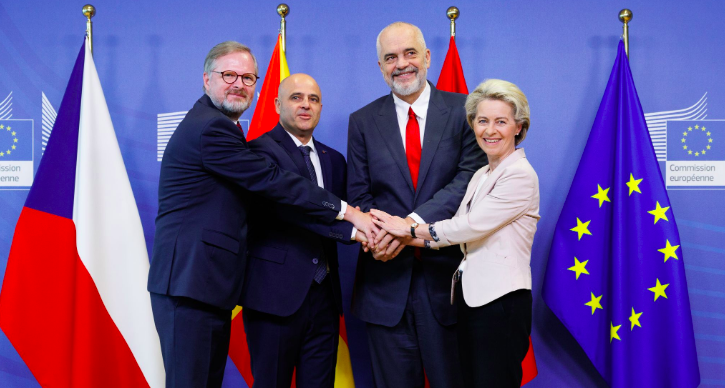TIRANA, July 19, 2022 – Albania and North Macedonia have started the formal process of negotiations for membership in the European Union after years of delays and disappointments.
The holding of the first intergovernmental conference in Brussels on Tuesday is the very first step in what is likely to be a lengthy process that could last a decade or more leading to full membership in the bloc if all criteria are met and all members agree.
The prime ministers of both countries, Edi Rama and Dimitar Kovečevski, were received by the President of the European Commission, Ursula Von der Leyen, and the Prime Minister of the Czech Republic, Petr Fiala, whose country holds the next Presidency of the EU.
“This is a historic moment,” said President Von der Leyen, while pointing out the efforts of both countries in their integration journey. “This is your success, yours as a government, your citizens, your people that you have worked so hard to get here and you have shown an incredible amount of commitment to our values.”
She added: “There will be an increase in investments, there will be various collaborations in key areas such as energy and transport. You will maximize the impact of EU funds, which means new jobs, new opportunities, and that’s exactly what your citizens have been waiting for so long and they deserve it.”
In his remarks, Prime Minister Rama thanked, on the one hand the European leaders and the French presidency that made it possible to unblock the impasse between Sofia and Skopje, but also the Albanian people “who never gave up and never stopped dreaming.”
Rama pointed out that a long road is ahead, when he said that “we know that this is not the beginning of the end, but it is the end of the beginning, but the situation is what it is.”
For Macedonian Prime Minister Kovacevski, whose country is starting the negotiation process after 17 years of waiting, due to disagreements first with Greece and more recently with Bulgaria, “today we are finally starting negotiations, we are opening a new perspective for our country and for our citizens and safely, we will join the big European family. This has been our strategic goal for years.”
As the president of the European Commission explained, the first step in the negotiation process after the intergovernmental conference will be followed by the work between the commission and the negotiating teams for the review of the European acts that will make it possible for Albania and North Macedonia to know the obligations on the treaties, above all the European agreements and we will continue with it very soon.
Sitting at the table for concrete talks goes through other procedures, which take time. In September, it is expected that Albania will be asked to explain where it stands in relation to the issues contained in the first group-chapter related to the rule of law. According to the new methodology, the talks are no longer conducted on the basis of separate chapters, but on six group-chapters, where without opening the one for the rule of law, no other can be opened.
After the explanation from Albania, the European Commission presents an evaluation report on where the country is with each of the chapters of the first group, and on its basis presents to the member countries what needs to be completed. In this case, decision-making is consensual, and each member country can make additions beyond the commission’s report. The ball then passes again to Albania, which must draw up the action plan for landing in the talks and only when it is considered that the standards for the opening of the talks have been met, the conclusion for the first group-chapter is proposed.
This is a process which represents a strong test for Albania. Beyond political will and commitment, it must prove that it also has the technical ability to move forward at this stage.
For North Macedonia, the situation is more specific. Before starting these procedures, it must first approve the envisaged constitutional changes.










